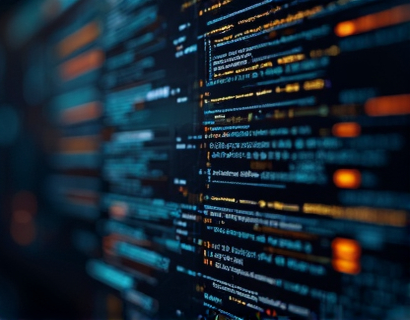AI and Crypto: Transforming Fintech Through Intelligent Solutions for the Digital Age
The intersection of artificial intelligence (AI) and cryptocurrency is revolutionizing the financial technology sector, ushering in a new era of digital finance. This fusion is not just a technological advancement but a paradigm shift that promises to make financial systems more efficient, secure, and personalized. As we delve into this transformative journey, it's essential to understand the foundational technologies and their applications in the fintech landscape.
Understanding AI and Cryptocurrency
Artificial intelligence, a branch of computer science, focuses on creating systems that can perform tasks requiring human intelligence, such as learning, reasoning, and self-correction. In the context of fintech, AI is leveraged to analyze vast amounts of data, detect patterns, and make predictions with high accuracy. On the other hand, cryptocurrency, a digital or virtual currency, uses cryptography for security and operates on a decentralized network, typically a blockchain, to facilitate transactions without intermediaries.
The combination of AI and cryptocurrency creates a powerful synergy. AI can enhance the functionality and security of cryptocurrencies, while cryptocurrencies provide a novel platform for AI applications in finance. This synergy is driving innovation in areas such as trading, risk management, and customer service, fundamentally altering how financial services are delivered and consumed.
Enhancing Trading and Market Efficiency
One of the most significant impacts of AI on cryptocurrency is in the realm of trading. AI algorithms can process and analyze market data at unprecedented speeds, identifying trends and making predictions that human traders might miss. These algorithms, often referred to as algorithmic traders or bots, can execute trades based on predefined criteria, 24/7, without emotional bias. This leads to more efficient markets where prices better reflect underlying values.
Moreover, AI-driven trading platforms can adapt to changing market conditions in real-time, optimizing portfolios and minimizing risks. Machine learning models can also detect anomalies and potential fraud, enhancing the security of transactions. For instance, AI can identify unusual trading patterns that may indicate market manipulation or insider trading, alerting regulators and investors alike.
Risk Management and Compliance
Risk management is a critical aspect of financial operations, and AI brings significant improvements in this area. By analyzing historical data and real-time market conditions, AI can assess and mitigate risks more effectively. For cryptocurrencies, which are known for their volatility, AI can help in setting stop-loss orders, managing exposure, and diversifying portfolios to reduce potential losses.
Compliance is another area where AI shines. Regulatory requirements for financial institutions are complex and ever-evolving. AI can automate the process of monitoring transactions for compliance with anti-money laundering (AML) and know-your-customer (KYC) regulations. This not only reduces the burden on compliance teams but also ensures that institutions stay ahead of regulatory changes.
Personalized Financial Services
The personalized experience promised by AI in fintech extends to cryptocurrency as well. AI can analyze user behavior, preferences, and financial goals to offer tailored investment advice and product recommendations. For example, a user interested in sustainable investments can receive suggestions for eco-friendly cryptocurrency projects or tokens that align with their values.
Furthermore, AI-powered chatbots and virtual assistants can provide 24/7 customer support, answering queries and guiding users through complex financial processes. This level of personalization enhances user satisfaction and loyalty, making financial services more accessible and user-friendly.
Security and Fraud Prevention
Security is paramount in the world of cryptocurrency, and AI plays a crucial role in fortifying defenses against cyber threats. AI algorithms can monitor network activity in real-time, detecting and responding to suspicious activities such as hacking attempts or phishing scams. By learning from past attacks, these systems become increasingly adept at preventing future breaches.
Smart contracts, self-executing contracts with the terms directly written into code, can also benefit from AI. AI can ensure that smart contracts adhere to predefined rules and conditions, reducing the risk of errors or malicious alterations. This enhances the trust and reliability of decentralized applications (dApps) built on blockchain technology.
Decentralized Finance (DeFi) and AI
Decentralized finance, or DeFi, is an emerging sector that leverages blockchain technology to create financial services without traditional intermediaries. AI is a key enabler in DeFi, offering solutions that enhance liquidity, optimize yields, and improve user experience. For instance, AI can predict liquidity pools' performance, helping users make informed decisions about where to allocate their funds.
AI-driven lending and borrowing platforms can assess creditworthiness more accurately by analyzing a broader range of data points, including non-traditional credit history. This democratizes access to credit, making financial services more inclusive. Additionally, AI can optimize yield farming strategies, automatically rebalancing portfolios to maximize returns while managing risk.
Challenges and Considerations
While the integration of AI and cryptocurrency offers numerous benefits, it also presents challenges that need to be addressed. One major concern is the regulatory landscape. As AI and cryptocurrency operate in a relatively uncharted territory, regulatory frameworks are still evolving. Ensuring compliance while innovating is a delicate balance that requires close collaboration between technologists, regulators, and industry stakeholders.
Another challenge is the explainability of AI models. Financial decisions made by AI should be transparent and understandable to users and regulators. Black-box models, which are difficult to interpret, can undermine trust and adoption. Therefore, developing explainable AI (XAI) is crucial for the widespread acceptance of AI in fintech.
Data privacy is also a significant issue. The use of AI involves processing large volumes of personal and financial data, raising concerns about privacy and data security. Implementing robust data protection measures and adhering to regulations like the General Data Protection Regulation (GDPR) is essential to build user trust.
Future Prospects
The future of AI and cryptocurrency in fintech is bright, with numerous opportunities for innovation and growth. As AI technologies continue to advance, we can expect even more sophisticated applications in areas such as predictive analytics, automated trading, and financial inclusion. The integration of AI with other emerging technologies like the Internet of Things (IoT) and 5G networks will further enhance the capabilities of financial systems.
Moreover, the rise of central bank digital currencies (CBDCs) presents a new frontier where AI can play a pivotal role. CBDCs, digital versions of traditional currencies issued by central banks, can leverage AI for more efficient and secure monetary policies. AI can help in designing optimal monetary policies, managing inflation, and ensuring financial stability.
In conclusion, the fusion of AI and cryptocurrency is transforming the fintech landscape, offering a more efficient, secure, and personalized financial experience. As the technology matures and regulatory frameworks evolve, the potential for AI to drive innovation in the financial sector is immense. For tech enthusiasts and financial innovators, this is an exciting time to explore and contribute to this dynamic field.










































